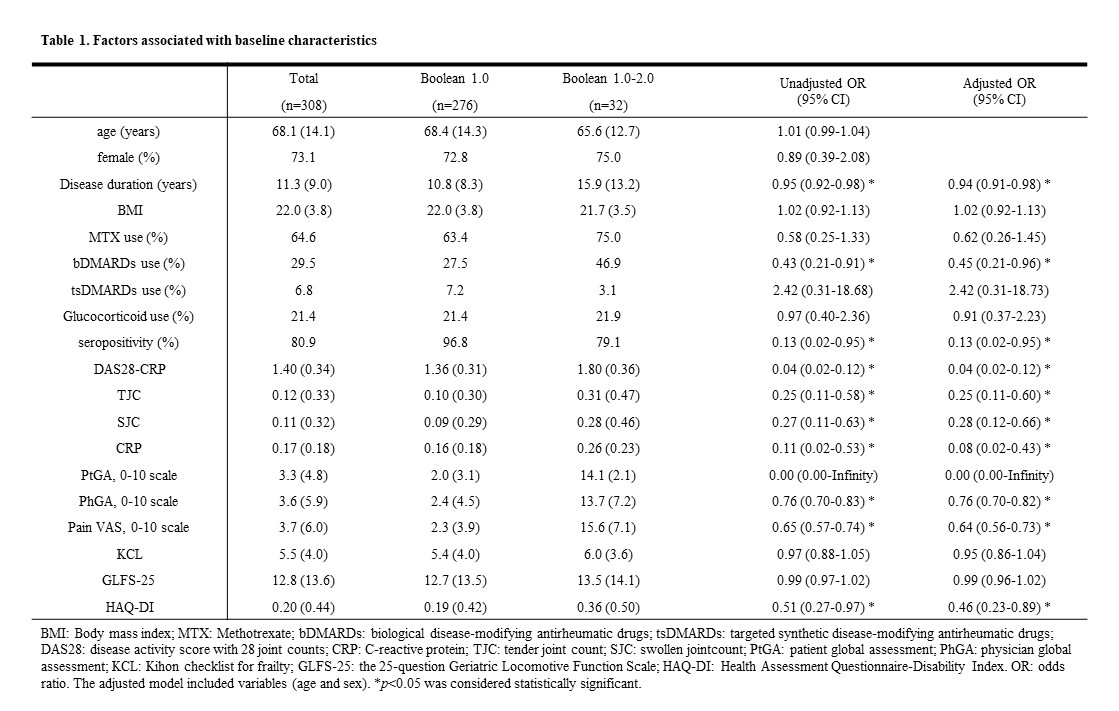Session Information
Date: Sunday, November 12, 2023
Title: (0380–0422) RA – Diagnosis, Manifestations, and Outcomes Poster I
Session Type: Poster Session A
Session Time: 9:00AM-11:00AM
Background/Purpose: The Boolean remission criteria proposed by the The American College of Rheumatology (ACR) and the European College of Rheumatology (EULAR) in 2011 are widely used as remission criteria for rheumatoid arthritis (RA) patients.
Until now, Boolean 1.0, which defined as a score 1 for each of TJC28, SJC28, CRP (mg/dl), and a Patient General Assessment (PtGA) ≤ 1 cm, has been used, but there have been concerns about overtreatment due to its too strict criteria. Therefore, Boolean 2.0, which uses a PtGA ≤2 cm, has recently been shown to be more consistent with Simplified Disease Activity Index (SDAI) remission criteria and has been described to be useful in clinical practice. The purpose of this study was to investigate the relationship between Boolean 2.0 remission and Boolean 1.0 remission and patient-reported outcomes (PRO) in RA patients using real clinical data.
Methods: Among 661 patients who visited the RA outpatient clinic between June and August 2022 (T-FLAG study) and whose patient background could be investigated, including Boolean remission, 308 patients who achieved the Boolean 2.0 remission criteria were included; a group of patients achieving Boolean 1.0 and a group of patients meeting the new criteria of The patient group that achieved Boolean 1.0 and the patient group that achieved Boolean 2.0 but not Boolean 1.0 (Boolean 1.0-2-0) were compared, and logistic regression analysis was performed to determine the background of patients who achieved Boolean 1.0-2.0. The cutoff values of the factors associated with Boolean 1.0-2.0 were calculated by ROC analysis.
Results: The mean age (± standard deviation) of the 308 patients who achieved Boolean 2.0 remission criteria was 68 ± 14 years, 73% were female, disease duration was 11 ± 9 years, DAS28-CRP was 1.40 ± 0.34, Health Assessment Questionnaire-Disability Index (HAQ-DI) was 0.20 ± 0.44, and KCL was 5.0 ± 4.0 (Table 1). Adjusted for age and gender, disease duration, biological disease-modifying antirheumatic drugs (DMARDs), seropositivity, and HAQ-DI were found to be relevant factors. The the 25-question Geriatric Locomotive Function Scale (GLFS-25), a PRO assessment of physical function, and the Kihon Checklist for Frailty Assessment (KCL) were not significantly associated factors. The HAQ-DI cutoff for achieving Boolean 1.0 was 0.25 points (sensitivity, 81.4%; specificity, 40.6%: AUC, 0.619).
Conclusion: RA patients with Boolean 1.0-2.0 were characterized by long disease duration and high use of biologic DMARDs. In addition, only HAQ-DI was involved as PRO assessment.
To cite this abstract in AMA style:
Suzuki M, Ohashi y, Sobue Y, Sato R, Maeda M, Kosugiyama H, Ohno y, terabe k, Asai S, Imagama S. The Impact of Patient-reported Outcomes on Boolean 2.0 Remission Criteria in Rheumatoid Arthritis Patients in Real Clinical Practice -a Multicenter Observational Study: T-FLAG Study- [abstract]. Arthritis Rheumatol. 2023; 75 (suppl 9). https://acrabstracts.org/abstract/the-impact-of-patient-reported-outcomes-on-boolean-2-0-remission-criteria-in-rheumatoid-arthritis-patients-in-real-clinical-practice-a-multicenter-observational-study-t-flag-study/. Accessed .« Back to ACR Convergence 2023
ACR Meeting Abstracts - https://acrabstracts.org/abstract/the-impact-of-patient-reported-outcomes-on-boolean-2-0-remission-criteria-in-rheumatoid-arthritis-patients-in-real-clinical-practice-a-multicenter-observational-study-t-flag-study/

